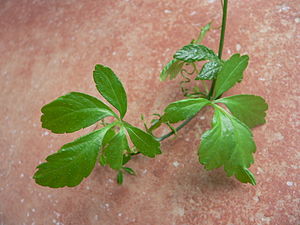Note: This is a project under development. The articles on this wiki are just being initiated and broadly incomplete. You can Help creating new pages.
Difference between revisions of "Gynostemma pentaphyllum - Jiaogulan"
(→Commonly seen growing in areas) |
(→References) |
||
| (5 intermediate revisions by 2 users not shown) | |||
| Line 1: | Line 1: | ||
[[File:Jiaogulan.JPG|thumb|right|''Jiaogulan'', ''Gynostemma pentaphyllum'']] | [[File:Jiaogulan.JPG|thumb|right|''Jiaogulan'', ''Gynostemma pentaphyllum'']] | ||
| − | + | '''Gynostemma pentaphyllum''' is a dioecious, herbaceous climbing vine of the family Cucurbitaceae indigenous. it normally grows in China, northern Vietnam, southern Korea, and Japan. | |
| − | |||
| − | |||
==Uses== | ==Uses== | ||
{{Uses|Blood sugar}}, {{Uses|Cholesterol}}, {{Uses|Blood pressure}}, {{Uses|Nervous tension}}, {{Uses|Peptic ulcer}}, {{Uses|Asthma}}, {{Uses|Bronchitis}}, {{Uses|Diabetes}}, {{Uses|Cardiovascular}}, {{Uses|Cancer}} | {{Uses|Blood sugar}}, {{Uses|Cholesterol}}, {{Uses|Blood pressure}}, {{Uses|Nervous tension}}, {{Uses|Peptic ulcer}}, {{Uses|Asthma}}, {{Uses|Bronchitis}}, {{Uses|Diabetes}}, {{Uses|Cardiovascular}}, {{Uses|Cancer}} | ||
| Line 42: | Line 40: | ||
===Fruit=== | ===Fruit=== | ||
| − | {{Fruit||7–10 mm (0.28–0.4 in.) long pome| | + | {{Fruit||7–10 mm (0.28–0.4 in.) long pome|Clearly grooved lengthwise, Lowest hooked hairs aligned towards crown|With hooked hairs|}} |
===Other features=== | ===Other features=== | ||
| Line 67: | Line 65: | ||
<references> | <references> | ||
| − | <ref name="chemical composition">[https://www.sciencedirect.com/science/article/pii/S0378874112006393?via%3Dihub | + | <ref name="chemical composition">[https://www.sciencedirect.com/science/article/pii/S0378874112006393?via%3Dihub Chemical constituents]</ref> |
| − | <ref name="Leaf">[https://web.archive.org/web/20131226161459/http://www.wildflowers-guide.com/39-agrimony.html | + | <ref name="Leaf">[https://web.archive.org/web/20131226161459/http://www.wildflowers-guide.com/39-agrimony.html Wayback machine]</ref> |
| − | <ref name="How to plant/cultivate">[https://www.pfaf.org/User/Plant.aspx?LatinName=Gynostemma+pentaphyllum | + | <ref name="How to plant/cultivate">[https://www.pfaf.org/User/Plant.aspx?LatinName=Gynostemma+pentaphyllum Cultivation details]</ref> |
</references> | </references> | ||
| Line 79: | Line 77: | ||
* [https://pubs.acs.org/doi/abs/10.1021/bk-2006-0925.ch013 Studies on Chemical Constituents of Jiaogulan (Gynostemma pentaphyllum)] | * [https://pubs.acs.org/doi/abs/10.1021/bk-2006-0925.ch013 Studies on Chemical Constituents of Jiaogulan (Gynostemma pentaphyllum)] | ||
[[Category:Herbs]] | [[Category:Herbs]] | ||
| + | [[Category:Ayurvedic herbs that don't have flower, fruit and leaf photos]] | ||
| + | [[Category:Ayurvedic herbs that don't have seed photos]] | ||
| + | [[Category:Cucurbitaceae]] | ||
Latest revision as of 16:14, 14 May 2020
Gynostemma pentaphyllum is a dioecious, herbaceous climbing vine of the family Cucurbitaceae indigenous. it normally grows in China, northern Vietnam, southern Korea, and Japan.
Uses
Blood sugar, Cholesterol, Blood pressure, Nervous tension, Peptic ulcer, Asthma, Bronchitis, Diabetes, Cardiovascular, Cancer
Parts Used
Chemical Composition
Phenolic, saponin, and flavonoid[1]
Common names
| Language | Common name |
|---|---|
| Kannada | |
| Hindi | |
| Malayalam | |
| Tamil | |
| Telugu | |
| Marathi | NA |
| Gujarathi | NA |
| Punjabi | NA |
| Kashmiri | NA |
| Sanskrit | |
| English | Jiaogulan |
Properties
Reference: Dravya - Substance, Rasa - Taste, Guna - Qualities, Veerya - Potency, Vipaka - Post-digesion effect, Karma - Pharmacological activity, Prabhava - Therepeutics.
Dravya
Rasa
Guna
Veerya
Vipaka
Karma
Prabhava
Habit
Identification
Leaf
| Kind | Shape | Feature |
|---|---|---|
| Simple | The leaves are divided into 3-6 toothed leaflets, with smaller leaflets in between |
Flower
| Type | Size | Color and composition | Stamen | More information |
|---|---|---|---|---|
| Unisexual | 2-4cm long | Yellow | 5-20 | Flowers Season is June - August |
Fruit
| Type | Size | Mass | Appearance | Seeds | More information |
|---|---|---|---|---|---|
| 7–10 mm (0.28–0.4 in.) long pome | Clearly grooved lengthwise, Lowest hooked hairs aligned towards crown | With hooked hairs | {{{6}}} |
Other features
List of Ayurvedic medicine in which the herb is used
- Vishatinduka Taila as root juice extract
Where to get the saplings
Mode of Propagation
How to plant/cultivate
Requires a rich well-drained but moisture-retentive soil in a warm sheltered position in partial shade[3]
Commonly seen growing in areas
Photo Gallery
References
External Links
- Ayurvedic Herbs known to be helpful to treat Blood sugar
- Ayurvedic Herbs known to be helpful to treat Cholesterol
- Ayurvedic Herbs known to be helpful to treat Blood pressure
- Ayurvedic Herbs known to be helpful to treat Nervous tension
- Ayurvedic Herbs known to be helpful to treat Peptic ulcer
- Ayurvedic Herbs known to be helpful to treat Asthma
- Ayurvedic Herbs known to be helpful to treat Bronchitis
- Ayurvedic Herbs known to be helpful to treat Diabetes
- Ayurvedic Herbs known to be helpful to treat Cardiovascular
- Ayurvedic Herbs known to be helpful to treat Cancer
- Herbs with Leaves used in medicine
- Herbs with Aerial parts used in medicine
- Herbs with common name in English
- Habit - Herb
- Index of Plants which can be propagated by Seeds
- Herbs that are commonly seen in the region of Tall grasslands
- Herbs that are commonly seen in the region of Meadows
- Herbs that are commonly seen in the region of Borders of forests and fields
- Herbs
- Ayurvedic herbs that don't have flower, fruit and leaf photos
- Ayurvedic herbs that don't have seed photos
- Cucurbitaceae
